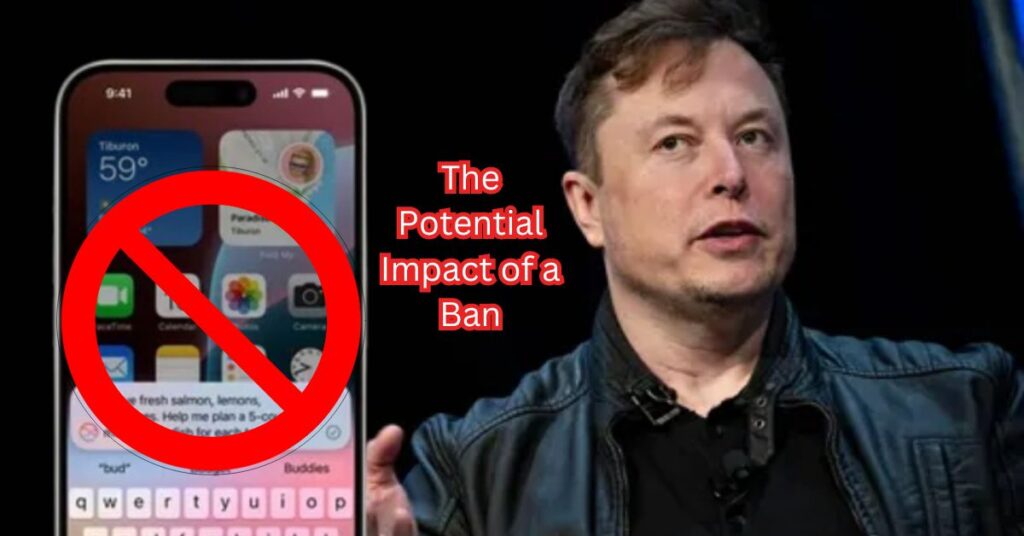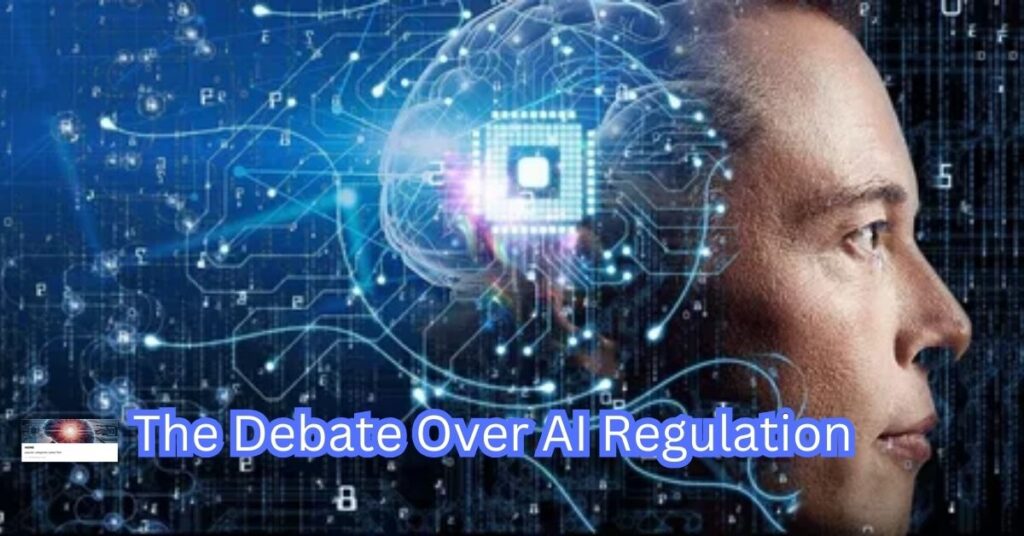Elon Musk the visionary CEO of Tesla, SpaceX, and now Twitter. Has threatened ‘’Elon Musk May Ban Apple Devices Over ChatGPT Integration’’ from his social media platform if the iPhone maker proceeds with integrating ChatGPT. The advanced language model developed by OpenAI, into its products and services. This bold stance has reignited the debate surrounding the responsible development and deployment of artificial intelligence (AI) technologies.
The Controversy Surrounding AI Integration

The potential integration of powerful language models like ChatGPT into mainstream consumer products has been a topic of intense discussion and controversy. While proponents laud the unprecedented capabilities these AI systems offer in areas such as natural language processing and generation, critics have raised valid concerns about the potential risks and ethical implications.
Also Read This: HOW TO MANAGE WARRANTY DATA WITH EZSUR จัดการข้อมูลการรับประกัน 2024?
Musk’s Stance on AI and Its Implications
Elon Musk has long been a vocal advocate for responsible AI development, warning about the potential dangers of unchecked advancements in this field. In a recent tweet, he stated that if Apple embraces what he calls the “woke mind virus” by integrating ChatGPT into its products, he would be forced to take drastic measures, including banning Apple devices from Twitter.
This stance aligns with Musk’s broader concerns about the potential misuse of AI systems and the need for stringent safeguards. As a visionary leader in the tech industry, his words carry significant weight and have reignited the debate surrounding AI regulation and ethical development.
Apple’s Reported Plans for ChatGPT
Reports have emerged that Apple, the technology behemoth behind the iPhone and other iconic devices, is exploring the integration of ChatGPT into its virtual assistant, Siri, and other products. While the company has acknowledged the potential benefits of leveraging advanced language models, it has remained tight-lipped about specific plans.
This move could enhance the capabilities of Apple’s products and services, offering users a more intuitive and intelligent experience. However, it has also raised concerns from critics who question the ethical implications and potential biases of such systems, particularly when it comes to handling sensitive personal data.
The Potential Impact of a Ban

If Elon Musk follows through on his threat to ban Apple devices from Twitter, the implications could be far-reaching and disruptive for both consumers and the companies involved.
Effects on Consumers
A ban on Apple devices would significantly inconvenience millions of Twitter users who rely on their iPhones, iPads, and other Apple products to access the platform. This could potentially lead to:
- A decline in user engagement and activity on Twitter
- Loss of revenue for the social media platform
- Frustration and inconvenience for consumers who would need to explore alternative devices or platforms
Implications for Apple and Twitter
For Apple, such a ban could tarnish its reputation and potentially lead to a loss of market share, particularly among Twitter users. The company would need to carefully navigate the fallout and potentially reevaluate its strategy regarding AI integration and partnerships.
On the other hand, Twitter would risk losing a significant portion of its user base, which could have severe financial and operational consequences. The platform might need to explore alternative revenue streams or risk losing its competitive edge in the social media landscape.
The Debate Over AI Regulation

The controversy surrounding AI integration and Musk’s stance highlight the broader debate over the need for regulation and ethical guidelines in the development and deployment of AI systems.
Concerns About AI Safety and Ethics
As AI systems become more sophisticated and prevalent, concerns have been raised about their potential impact on:
- Privacy and data security
- Perpetuating biases and discrimination
- Unintended consequences and existential risks
Critics argue that unchecked AI development could lead to scenarios where these powerful systems are misused or cause unintended harm, compromising the well-being of individuals and society.
The Need for Responsible AI Development
Proponents of responsible AI development advocate for the establishment of clear ethical guidelines, transparency, and accountability measures to ensure that AI systems are developed and deployed in a responsible and socially beneficial manner. This includes addressing issues such as:
- Data privacy and security
- Algorithmic bias and fairness
- Transparency in decision-making processes
- Potential misuse or unintended consequences
By adhering to these principles, companies and developers can demonstrate their commitment to responsible AI practices and alleviate concerns from critics and the general public.
Alternatives to a Ban
While Musk’s stance on banning Apple devices may seem drastic, there are alternative approaches that could be explored to address the concerns surrounding AI integration.
Collaboration and Compromise
Rather than taking an adversarial approach, companies like Apple and Twitter could engage in open dialogue and collaboration to develop mutually acceptable guidelines and safeguards for AI integration. This could involve:
- Seeking input from experts, policymakers, and stakeholders
- Establishing industry-wide standards and best practices
- Developing transparent and accountable governance frameworks
By working together and finding common ground, these companies could harness the potential benefits of AI while addressing valid concerns about safety and ethics.
Ethical Guidelines and Standards
The tech industry as a whole could work together to establish industry-wide ethical guidelines and standards for the development and deployment of AI systems. This could involve principles such as:
- Transparency and explain ability
- Fairness and non-discrimination
- Privacy and data protection
- Human oversight and control
By adhering to these standards, companies could demonstrate their commitment to responsible AI practices and alleviate concerns from critics and the general public.
The Future of AI Integration

Regardless of the outcome of this particular controversy, the integration of advanced AI systems like ChatGPT into consumer products and services is likely to continue, driven by the potential benefits and competitive advantages it offers.
Emerging Trends and Use Cases
AI language models are already being explored for a wide range of applications, including:
- Virtual assistants and customer service
- Content generation and creative endeavors
- Language translation and localization
- Automated coding and software development
As the technology continues to evolve, we can expect to see even more innovative use cases emerge, transforming various industries and aspects of daily life.
Balancing Innovation and Responsibility
However, as AI integration becomes more prevalent, it will be crucial for companies, policymakers, and society as a whole to strike a balance between harnessing the benefits of these technologies and addressing the ethical and social implications. This requires:
- Ongoing dialogue and public engagement
- Robust governance frameworks and regulatory measures
- A commitment to responsible innovation that prioritizes the well-being of individuals and society
By striking this balance, we can unlock the transformative potential of AI while mitigating potential risks and ensuring that these technologies are developed and deployed in an ethical and responsible manner.
Conclusion
The potential ban on Apple devices by Elon Musk over the integration of ChatGPT highlights the complex challenges and debates surrounding the development and deployment of advanced AI systems. While the technology holds immense potential, it also raises valid concerns about safety, ethics, and responsible use.
As AI continues to evolve, it is crucial for all stakeholders – companies, policymakers, experts, and the general public – to engage in open dialogue, establish clear guidelines, and prioritize responsible innovation that benefits society while mitigating potential risks.
Ultimately, the path forward lies in finding a balance between harnessing the power of AI and ensuring it is developed and utilized in a manner that upholds ethical principles and safeguards the well-being of individuals and communities.
Frequently Asked Questions
What is ChatGPT, and why is it controversial?
ChatGPT is an advanced language model developed by OpenAI, capable of generating human-like text based on the input it receives. The controversy arises from concerns about the potential misuse or unintended consequences of such powerful AI systems, including perpetuating biases, compromising privacy, or even posing existential risks if not developed and deployed responsibly.
Why does Elon Musk oppose the integration of ChatGPT by Apple?
Elon Musk, a vocal advocate for responsible AI development, has warned about the potential dangers of unchecked AI advancements. He believes that integrating ChatGPT into Apple’s products without proper safeguards could be a “woke mind virus,” referring to the potential biases and ethical concerns surrounding such AI systems.
What are the potential implications of a ban on Apple devices by Twitter?
If Elon Musk follows through on his threat, it could significantly inconvenience millions of Twitter users who rely on Apple devices, leading to a decline in user engagement and revenue for Twitter.
What steps can be take to ensure responsible AI development?
- Establish clear ethical guidelines and standards for AI development and deployment, focusing on principles like transparency, fairness, privacy protection, and human oversight.
- Foster collaboration between companies, policymakers, experts, and stakeholders to develop robust governance frameworks and regulatory measures.
- Encourage ongoing public dialogue and engagement to understand and address societal concerns surrounding AI technologies.
- Prioritize research and development in areas like AI safety, robustness, and interpretability to mitigate potential risks and unintended consequences.
How can companies like Apple and Twitter find a middle ground on AI integration?
To find a middle ground, Apple and Twitter could explore the following approaches:
- Engage in open and transparent dialogue to understand each other’s concerns and perspectives.
- Collaborate on developing mutually acceptable guidelines and safeguards for AI integration, leveraging input from experts, policymakers, and stakeholders.
- Consider establishing an independent advisory board or committee to provide oversight and guidance on responsible AI practices.
- Prioritize user privacy and data protection measures when integrating AI technologies into their products and services.

As the admin of techtasion.com, I bring over 4 years of expertise in SEO and guest blogging. My passion lies in optimizing online presence and creating impactful guest posts. Dedicated to driving growth and delivering value through strategic digital content.
Pingback: GET_READY_BELL:CLIENT_PULSE: A GUIDE TO UNDERSTANDING AND ENHANCING CLIENT PULSE 2024
Pingback: The Ultimate Guide to Submit an Activision Ban Appeal in 2024
Pingback: Bestadvise4u.com News Latest Updates & Expert Guidance
Pingback: Thesparkshop.in: Product Batman-Style Wireless BT Earbuds – Reviews